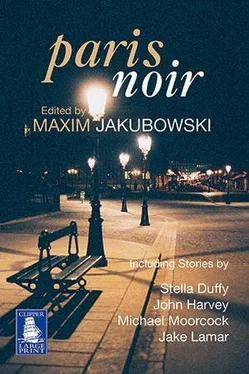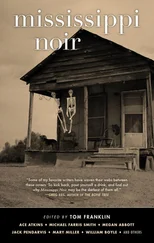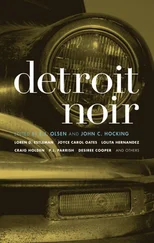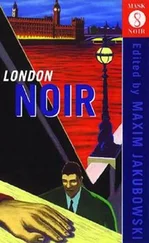Maxim Jakubowski - Paris Noir
Здесь есть возможность читать онлайн «Maxim Jakubowski - Paris Noir» весь текст электронной книги совершенно бесплатно (целиком полную версию без сокращений). В некоторых случаях можно слушать аудио, скачать через торрент в формате fb2 и присутствует краткое содержание. Жанр: Детектив, на английском языке. Описание произведения, (предисловие) а так же отзывы посетителей доступны на портале библиотеки ЛибКат.
- Название:Paris Noir
- Автор:
- Жанр:
- Год:неизвестен
- ISBN:нет данных
- Рейтинг книги:3 / 5. Голосов: 1
-
Избранное:Добавить в избранное
- Отзывы:
-
Ваша оценка:
- 60
- 1
- 2
- 3
- 4
- 5
Paris Noir: краткое содержание, описание и аннотация
Предлагаем к чтению аннотацию, описание, краткое содержание или предисловие (зависит от того, что написал сам автор книги «Paris Noir»). Если вы не нашли необходимую информацию о книге — напишите в комментариях, мы постараемся отыскать её.
Edited by Maxim Jakubowski, the stories range from quietly menacing to spectacularly violent, and include contributions from some of the most famous crime writers from both sides of the Atlantic, as well as the other side of the Channel.
Paris Noir — читать онлайн бесплатно полную книгу (весь текст) целиком
Ниже представлен текст книги, разбитый по страницам. Система сохранения места последней прочитанной страницы, позволяет с удобством читать онлайн бесплатно книгу «Paris Noir», без необходимости каждый раз заново искать на чём Вы остановились. Поставьте закладку, и сможете в любой момент перейти на страницу, на которой закончили чтение.
Интервал:
Закладка:
There is a plan here. I have followed it to the letter. His letter.
I go to her restaurant, our restaurant, their restaurant. I ask for her table. The waiter, clearly a part-timer, one I have not seen before, raises an eyebrow, the maître d’, just turning from seating a couple of regulars, sees me, hurries over. Pushes the foolish young man aside, takes both my hands in his, takes my jacket, takes my arm, takes me. He is so very sorry. I must be tired. Here, here is my seat, here is her table, there are tears in his eyes. They will feed me he says, it will be their pleasure, they are so sorry. I expect they are. She was here almost every day. Not always with me. Of course the staff here are sorry.
I eat my meal. Three courses. I do not need to order, the patron himself tells the waiter to say that this is his recommendation, I agree. The patron does not come to speak with me, not yet, not now. He has work to do. and so do I. And anyway, he and I should not be seen together, not yet. Wine. Water. Coffee. Armagnac. She thought it was very foreign of me to ask for a liqueur with my coffee. The kind of thing only tourists or old ladies might do. Apparently it was inelegant, childish. I did it despite her disapproval. I do it to spite her now, despite her now.
A classic French meal, in a classic Paris restaurant. Sun shining through the mottled glass windows, lead light yellow and green and red. A businessman dines alone across from me. He too has three courses and wine and coffee, and will go to the office after his three-hour break and work steadily until dark. A wealthy tourist couple argue over the menu, which is entirely in French, it makes no concession to their cash, demands they rack their misspent youth for lost words. To my right a young couple, run from their work for half an hour here and an hour in bed, then back to run the world. To my left a middle-aged gay couple and their sleeping dog. This is civilised Paris, the dog is as welcome as the homosexuals. Everyone should eat well, taste is all. I could sit here all afternoon and stare around me. I could never go to my next appointment. I have no choice. It is fortunate that the young man who places the burning plate in front of me with a low ‘attention Madame’ annoys me, draws me back to this place, this time, to what happens next. He annoys me in two ways. One, as he too clearly stated, I am Madame, not Mademoiselle. He could have been kinder, generosity is always welcome. Two, I didn’t think it was just the plate he was suggesting needed care. This I understand as well. Those that fed her knew her. There are many things of which I must be careful.
They are well-trained though, these young men. Young men only of course, no waitresses, the food too precious to be tainted by women’s hands. These are the best. There is the waiter who, hearing a lighter fail to strike three times across the room, arrives with another lighter, working correctly. The customer wishes to light his own cigar and the waiter leaves it beside him. Two minutes later, cigar lit and smoking, the customer continues to strike again and again at his own lighter, striking against hope, the failure of his own tool still a problem despite the waiter’s speedy solution to the immediate problem. And where any normal person might laugh at the man, or think him a bloated fool, too occupied in his missing flame to pay attention to his charming dinner companion, she who sits bored and irritated by his attention to pointless detail, the waiter senses the man’s distress as well as the woman’s slow fury, takes away the offending lighter, there is fuel in the kitchen he says, and returns just moments later, the fresh flame a bright torch to lead him on.
I love these windows, in summer they slide back to tables on the street, in winter they hold back, with their coloured glass, the worst of the grey. Today they keep me in warmth, for now. Cheese. Time is passing. Time is near. I feel it, waiting, demanding. I wonder if she felt it, if she knew her time was near. I doubt it. She had such an exquisite sense for food, for wine, for sex, for fabric – a perfect cut, an ideal line. But very little awareness at all of the kind of day-to-day passing of time that most of us understand once we have left youth behind, once we are Madame not Mademoiselle. One of the perfectly trained young men takes a short stout knife and digs me out a crumbling chunk of Roquefort. It is not what I asked for. I did not ask. In his wisdom he decided this was the correct coda to my meal. It is perfect, both creamy and crystalline, aggressive in my mouth. I also requested goat’s cheese. His disdain is too well trained to show a customer of my long standing. In contrast to the Roquefort it is a smooth bland paste. The young man is right, it is no doubt wrong to eat the two together, yet, in my mouth, where they belong, the blend is perfect. The one all flavour and bite, the other a queen of texture, of touch. Marie-Claude and I were no doubt wrong together, actually perfect. No doubt perfect, actually wrong.
Through the hatch at the back of the room, I watch the only black man in the building. Daoud has spent the past hour washing dishes, will give hours yet. Sweat falls in a constant drip from his face to the scalding greasy water, his bare hands plunge repetitively, constant action, disregarded heat, all movement, all moment. I am fond of Daoud, my French is poor, his English nonexistent, we have smiled to each other through his hatch, during a hundred or more lunches. I have always thanked him too, for his work. Marie-Claude said that in Algeria he had his own restaurant. She dismissed it though, said the food could not be of any standard. I am not especially fond of North African food myself, often find it cloying, heavy. But Daoud is a generous man and, much as I suspect he found her non-recognition easier to bear than my typical foreign civility to all, he did not repel my need to patronise, to charm. Today he has not once looked towards me. He must know I am here, but he has not offered me a glance. In the time-honoured tradition of silent servants and slaves everywhere, I assume he knows what was done. Or maybe he’s just pissed off I haven’t been here for so long. I doubt many of the customers here feel enough white liberal guilt to specifically insist that some of the tip must be shared with the dishwasher. I wonder which annoys him more? My need to expiate the colonialist’s guilt with ten-euro notes or my part in the death of his boss’s wife? Fortunately I do not speak his languages. He will never be able to tell me.
Near the end of the service the man himself comes out from the kitchen, the patron. A big man, with the haircut he fell in love with at the age of eighteen and hasn’t cared to change for forty years, his broad body held into the black shirt and trousers beneath the stained apron, not a traditionally good-looking man by any means, but his food is beautiful. His staff must have told him I was here the moment I entered the building, but he has waited until after the meal, as always, to come and be among his guests. He walks the room, greeting customers and friends as if they were all alike. He does not come to my table, to me at her table. I understand. This is a public place, he must be careful. We must be careful.
I drain the last of my armagnac, an oil slick of golden liquid clinging to the side of the glass. I am tempted to run my finger in the residue, lick it up. I don’t. I pay my bill, leave the room, I have an appointment near the river.
I leave the restaurant in the quiet street with no river view, full of food and wine and apprehension. I enjoyed the meal, it was always good to eat there, but as so often, on leaving, I wonder if a meal in an elegant room with subdued lighting and quiet conversation can ever be as ripe or delicious as the proverbial chunk of bread and lump of cheese in the fresh air with a river view? Certainly it is not that much more expensive, the river view comes at such a cost these days, every modern city in the world having finally realised the pleasure of water and priced their dirty old riverside or waterfront or sea wall or boardwalk accordingly. In the old days, when rivers were full of filth and traffic and we could not control their tides, the choice for those who could afford it was to look away from the water, to turn the backs of their buildings to it. In time though, roads became our dirty passageways and now the water is the view of choice. It is the place where people stand, gazing out and down, demanding explanation from a flow that has existed long before us and will, global warming notwithstanding, continue. The river will always continue, no matter what gets in its way. Which is how I come, at the appointed time, in the correct place, with due formality and careful ceremony, to be staring down at the bloated body of my lover.
Читать дальшеИнтервал:
Закладка:
Похожие книги на «Paris Noir»
Представляем Вашему вниманию похожие книги на «Paris Noir» списком для выбора. Мы отобрали схожую по названию и смыслу литературу в надежде предоставить читателям больше вариантов отыскать новые, интересные, ещё непрочитанные произведения.
Обсуждение, отзывы о книге «Paris Noir» и просто собственные мнения читателей. Оставьте ваши комментарии, напишите, что Вы думаете о произведении, его смысле или главных героях. Укажите что конкретно понравилось, а что нет, и почему Вы так считаете.











